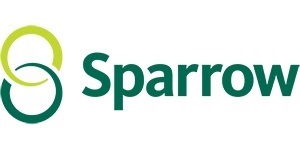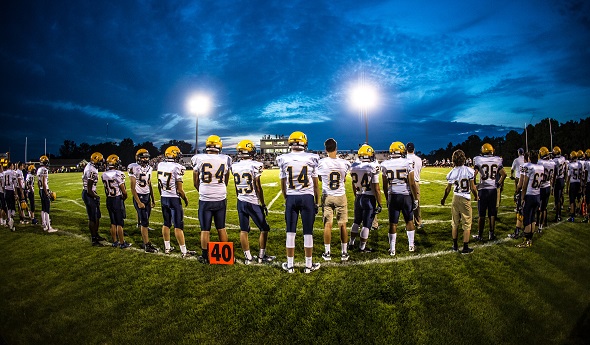
MHSAA Teams with Sparrow Health
February 16, 2015
By Geoff Kimmerly
Second Half editor
Providing information and best practices to players, parents, coaches and administrators on how best to minimize health risks is a key component of keeping student-athletes safe. The Michigan High School Athletic Association has teamed with Sparrow Health System of Lansing to better inform its member schools on such health and safety matters.

Sparrow, a member of the prestigious Mayo Clinic Care Network, is mid-Michigan’s premier healthcare organization with more than 10,000 caregivers. Sparrow’s Sports Medicine division offers programs for athletes at all levels and includes primary care physicians, orthopedic surgeons, physical therapists and athletic and performance trainers.
Sparrow will lend its expertise through the MHSAA Website and on-site at various MHSAA tournament events. Resources from Sparrow staff, including information on current health and safety topics and trends, will be accessible online through the Health & Safety page of the MHSAA Website.
Sparrow’s contributions also will be promoted through the MHSAA’s multiple social media platforms. “This partnership is one of the biggest steps we’ve ever taken to build the MHSAA’s capacity to address the almost daily questions we receive about student-athlete health and wellness, and to sort out and solve the biggest issues of school sports safety,” said John E. “Jack” Roberts, executive director of the MHSAA.
A key component to Sparrow’s addition to the MHSAA Website is an “Ask the Experts” feature that connects users directly to Sparrow’s Sports Medicine staff. Sparrow also will set up booths at various MHSAA tournaments where staff will be available to answer similar questions and discuss sports medicine-related issues.
“Sparrow is thrilled to partner with the MHSAA,” said Stella Cash, Sparrow vice president for development and strategic partnerships. “We have the region’s pre-eminent primary care physicians trained in sports medicine who specialize in the prevention and treatment of sports-related injuries.
Parents and coaches can turn to us for all health-related issues and trust we are focused on transforming care to keep their high school athletes fit, healthy and in the game.”
Sparrow Health System includes hospitals in Lansing, St. Johns, Ionia and Carson City as well as Physicians Health Plan, Sparrow Physicians Health Network, the Sparrow Medical Group and the Michigan Athletic Club. Sparrow also is affiliated with Michigan State University’s three human health colleges.
The MHSAA is a private, not-for-profit corporation of voluntary membership by more than 1,400 public and private senior high schools and junior high/middle schools which exists to develop common rules for athletic eligibility and competition. No government funds or tax dollars support the MHSAA, which was the first such association nationally to not accept membership dues or tournament entry fees from schools. Member schools which enforce these rules are permitted to participate in MHSAA tournaments, which attract more than 1.4 million spectators each year.

MHSAA Opposes Big Ten Friday Football
November 2, 2016
By Geoff Kimmerly
Second Half editor
The executive director of the Michigan High School Athletic Association said today that he is “disappointed and disheartened” by the Big Ten Conference announcement that it will play and televise football games on Friday nights beginning with the 2017 season.
Friday night football remains one of the strongest and longest-standing traditions in high school athletics, and the MHSAA has fought since the start of this century to keep Friday nights sacred against the overstepping of college football and the damage televised Big Ten games are now expected to cause to attendance and media coverage of the sport at the high school level.
MHSAA Executive Director John E. “Jack” Roberts was contacted by both Big Ten Conference commissioner Jim Delany and Michigan State University athletic director Mark Hollis before the decision was announced. Roberts said he is appreciative of Michigan State and University of Michigan’s low tolerance to be included in this venture – at most, both will host a Thursday or Friday night game during Labor Day weekend and play one Friday night away game during the remainder of a season – but remains frustrated that similar respect for high school football was not shown by the conference as a whole.
Michigan State has played Friday night games during Labor Day weekend the last six seasons, hosting five and playing at Western Michigan University in 2015. However, most Michigan high school games continue to be scheduled and played on the Thursday before Labor Day, relieving holiday travel conflicts in most communities. University of Michigan did play on the Thursday before Labor Day at University of Utah in 2015, but has not played on a Friday night of Labor Day weekend this decade. The Wolverines are one of five Big Ten schools without a Friday night game in 2017.
“We are saddened by this decision. We had hoped that the Big Ten Conference would stay above this. We think this cheapens the Big Ten brand,” Roberts said. “Fans won’t like this. Recruits won’t like this. And high school football coaches won’t like this.
“We are grateful that Michigan State University and the University of Michigan are trying to minimize the effects of this decision by the Big Ten. But overall, this is just the latest step by major college athletics in the pursuit of cash that is just crushing high school sports.”
The MHSAA has shown its opposition to the use of Friday nights for televised collegiate football games for more than 15 years, dating back to 2001 when the NCAA lifted its restrictions on Friday night telecasts, which at first led to the broadcasting of “mid-major conference” games on the same night traditionally reserved for high school athletes.
The MHSAA launched in 2001 its “Save Our Friday Nights” campaign to emphasize the role that Friday night high school athletic events play in communities and to rally MHSAA member schools to contact NCAA member school football coaches, athletic directors and conference commissioners to voice their concerns.
In addition to causing lower attendance at events going up against Big Ten football games, Roberts anticipates that Friday night college games also will leave high school football as a secondary priority in many media markets. More than 80 radio stations statewide cover high school games regularly, but many also carry Michigan State or University of Michigan football. High school football could lose significant time on local TV highlights shows and in print and online coverage as well, as resources are diverted to cover a college game – potentially quieting significantly the positive buzz that comes from the typical high school football Friday night.
“Everyone knows that football is struggling right now,” Roberts said. “It’s getting a lot of bad publicity. Participation is declining. And now this; there couldn’t be worse timing.”
PHOTO: Grand Ledge takes on Okemos under the Friday night lights this season. (Click to see more from HighSchoolSportsScene.com.)

